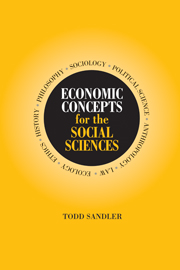Book contents
- Frontmatter
- Contents
- Table and Figures
- Preface
- 1 Economics without Apology
- 2 Back to the Future: Political Economy
- 3 In Another's Shoes: Games, Strategies, and Economics
- 4 It Takes Two or More: Public Economics and Collective Action
- 5 Government for the Politician? Public and Social Choice
- 6 Institutions Matter: The New Institutional Economics
- 7 Knowledge Is Power: Asymmetric Information
- 8 Everything Ties Together: General Equilibrium
- 9 Laboratory Economics: Of Rats and Men
- 10 Before Yesterday and Beyond Tomorrow: Intergenerational Economics
- 11 Fish, Space, and Spaceship Earth: Bioeconomics and Interdisciplinary Economics
- 12 Crystal Ball Economics: Rational Expectations
- 13 How Do We Get There from Here? Transition Economies and Policy Reforms
- 14 Economic Growth: Endogeneity, Institutions, and Other Concepts
- 15 Economic Visions of Future Horizons
- References
- Author Index
- Subject Index
15 - Economic Visions of Future Horizons
Published online by Cambridge University Press: 14 May 2010
- Frontmatter
- Contents
- Table and Figures
- Preface
- 1 Economics without Apology
- 2 Back to the Future: Political Economy
- 3 In Another's Shoes: Games, Strategies, and Economics
- 4 It Takes Two or More: Public Economics and Collective Action
- 5 Government for the Politician? Public and Social Choice
- 6 Institutions Matter: The New Institutional Economics
- 7 Knowledge Is Power: Asymmetric Information
- 8 Everything Ties Together: General Equilibrium
- 9 Laboratory Economics: Of Rats and Men
- 10 Before Yesterday and Beyond Tomorrow: Intergenerational Economics
- 11 Fish, Space, and Spaceship Earth: Bioeconomics and Interdisciplinary Economics
- 12 Crystal Ball Economics: Rational Expectations
- 13 How Do We Get There from Here? Transition Economies and Policy Reforms
- 14 Economic Growth: Endogeneity, Institutions, and Other Concepts
- 15 Economic Visions of Future Horizons
- References
- Author Index
- Subject Index
Summary
Over the last century, economics has become more analytical and quantitatively sophisticated, making it even less accessible to nonspecialists and requiring a greater “entry fee” for those wanting to be professional economists. Even for those interested in just a rudimentary understanding of economics, the cost may seem excessive, as many college students discover when taking courses in the principles of economics. There is no reason that economics needs to be so arcane, because with a little effort on the part of economists it could be made understandable to a wide audience. With its myriad applications to fascinating topics (for example, the internet, the alleviation of poverty, economic development, the adoption of new technologies, and outer space resources), the task of interesting students and making the subject relevant could not be easier.
Too often I read or review articles in which the argument and analysis have been made very complex, when a much simpler and more transparent presentation would serve just as well. Many years ago I worked with a bright junior colleague who gave me a five-page proof for a paper that we were collaborating on. With some thought, I managed to reduce the proof to just one line. When shown the simpler and more intuitive proof, he lost his temper and stormed out of my office, not to return for two days. The paper with the shorter proof was later published in a top journal; and my colleague applied what he had learned and went on to a very successful career.
- Type
- Chapter
- Information
- Economic Concepts for the Social Sciences , pp. 244 - 258Publisher: Cambridge University PressPrint publication year: 2001



